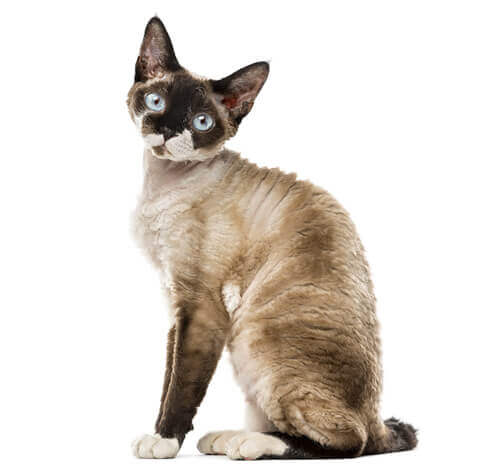
Devon Rex
The Devon Rex is sometimes called a poodle that purrs, due to her curly coat and wagging tail when she is happy. Also described as the pixie of the cat world, the Devon Rex has a pixielike face and large, inquisitive eyes. This extraordinarily social cat is a wonderful family pet that gets along well with cats and cat friendly dogs. A highly active breed, the Devon Rex is known for her clownlike antics.
DID YOU KNOW? Originally, it was thought that Devon Rex and Cornish Rex shared the same spontaneous genetic mutation responsible for their curly coats. When breeders realized that the cats had separate genetic variations, the first rexed cats, the Cornish Rex, were referred to as Gene I Rex and the Devon Rex as Gene II Rex.
The need-to-know
- Highly active and inquisitive cat
- Friendly but independent cat
- Somehow talkative cat
- Lean and elegant cat breed
- Requires grooming once a week
- Needs some out-door space
- May require familiarisation before living with children
Personality

Devon Rex cats are fondly described as 'little terrors' and 'monkeys in cats' clothing' with antics such as swinging from the curtains and climbing the wallpaper! They are lively and extrovert cats. They have several 'dog-like' qualities, such as a fondness for fetching toys, and can be trained to walk on a harness and lead. They are very gentle and loving cats, and hate to be bored or alone. Visitors to the house may be surprised to find that they are thoroughly investigated by a nosy Devon Rex cat before they have a chance to sit down!
History and Origins

Country of Origin: England (county of Devon)The Devon Rex cat breed stems from a curly-coated cat found in Devon in 1960. Like the Cornish Rex cat breed, the Devon cat's coat is caused by a recessive gene, and inbreeding was necessary to perpetuate the breed. The Devon cat gene is, however, different to that which curls the coat of the Cornish Rex, and crossing Devon Rex cats and Cornish Rex cats produces litters of straight-coated kittens. The two mutations must have arisen independently, despite arising so close geographically, ie, in Devon and Cornwall. Within 10 years of discovery, the breed was recognised in Britain.
Nutrition and Feeding

Every cat is unique and each has their own particular likes, dislikes, and needs when it comes to food. However, cats are carnivores and every cat must obtain 41 different and specific nutrients from their food. The proportion of these nutrients will vary depending on age, lifestyle and overall health, so it's not surprising that a growing, energetic kitten needs a different balance of nutrients in her diet than a less active senior cat. Other considerations to bear in mind are feeding the right quantity of food to maintain 'ideal body condition' in accordance with feeding guidelines and catering to individual preference regarding wet or dry food recipes.
Other Information

Health and common issues
Because of the nature of its coat, the Devon Rex cat can be prone to yeast infections of the skin that can cause ear problems, greasy deposits on the skin and itching. Rexes can also be prone to baldness, a disorder known as hypotrichosis. Because of the back-crossing needed to establish the breed's initial gene pool, there have in the past been genetic spasticity problems associated with the breed (known as Devon Rex myopathy), but careful breeding has all but eliminated this now.
Best cat breeds for children
While this breed is not widely recognised as one of the best breeds for children, all cats are different and with the proper familiarisation may still be able to live with children.